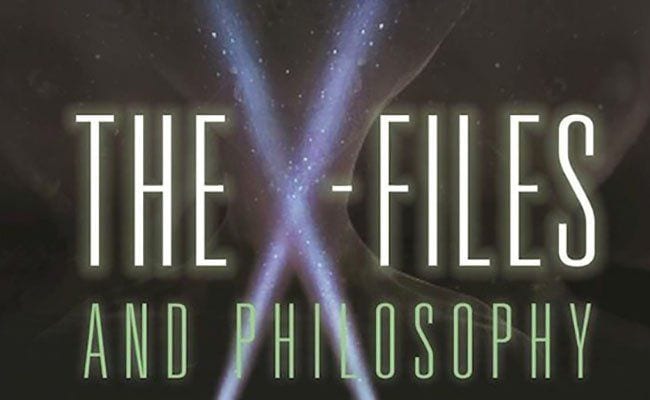
Trust no one, but Fox (the network, not Mulder) says The X-Files will return in 2018, following excellent ratings for last summer’s six-episode revival. For old and new fans of the show, the truth is out there on various streaming platforms where the old seasons are available. Whether you watch the series anew or use a hypnotist to help recall 20-year-old episodes, you may discover the show’s quality can be uneven at times. I want to believe Darin Morgan’s continued involvement in the series means we will get, at the bare minimum, one excellent story about heroes Agent Fox Mulder and Agent Dana Scully next year.
For anyone interested in mining the show’s deeper themes, the short chapters The X-Files and Philosophy: The Truth Is in Here, the 108th volume in Open Court Publishing’s Popular Culture and Philosophy series, will serve as a nice companion. Editor Robert Arp has assembled a group of philosophers who use examples from The X-Files to explain dense philosophical ideas, translating their expertise into an accessible form. Like episodes from the show itself, some of the 35 essays stand out. Their brevity makes the full book a breeze, though readers could easily pick and choose chapters based on their favorite episodes or their philosophical interests.
The book’s ten parts run the thematic gamut, from philosophy of science, to theories of the mind’s relationship to the body, to the concept of fear itself. The chapters could also be placed into three categories: essays that use philosophy to uncover new layers of meaning within the world of The X-Files, essays that use the show to teach philosophical terms and ideas, and essays that are simply pleasurable to read as they playfully muse on the titular themes. In fact, most of the chapters accomplish two or three of these goals, but these categories are also a good way to highlight what makes many of the essays particularly excellent.
John M. Thompson’s “The Madness of Sneaky Fox” exemplifies the first category, blending philosophical ideas about insanity with sociological approaches to understanding differing worldviews, ultimately extracting new meaning from the show itself. The chapter is memorable even though it focuses on a forgettable season one episode, “Shapes”. Scully, representing America’s dominant culture, implies the worldviews of indigenous Americans in this episode are insane. As always, Mulder solves the mystery through his insane belief in what to Scully is irrational. Moreover, Mulder’s willingness to ignore typical standards of insanity allows him exclusive access to a Native American culture. Crazy Mulder’s willingness to “cross over into different worlds” is, according to Thompson, the secret to his success.
In “Monday… Again”, Jeremy Pierce teaches concepts of causality through examples from two specific episodes dealing with fate. Though Scully has a deterministic view of fate, she, like the Stoics, believes a person’s freely developed character and desires cause his or her actions. Mulder, on the other hand, seems to side with the Epicureans in his belief in random variations. Epicurus and Mulder seem to be proven correct in “Monday”, the season six episode that resembles Groundhog Day. Unlike Bill Murray’s character, Mulder and Scully never realize they are trapped in a repeating day, and yet, just as Epicurus predicted, they act and respond slightly differently each time the day starts over.
In season seven’s “The Goldberg Variation”, Mulder and Scully encounter, Harry Weems, the luckiest man in the world. Pierce uses the premise to introduce Aristotle’s “four causes”, concluding that both episodes suggest some force is controlling events toward a final cause, a mind of sorts directing all events towards a goal that, in “Monday”, saves the lives of Mulder and Scully and, in “The Goldburg Variation”, helps Harry Weems’s young friend get a liver transplant.
Aristotle’s ideas return in “Submitting to Superior Aliens”, by Jerold J. Abrams. In Politics, Aristotle explores how humans might react if a superior race of demigods suddenly appeared. Abrams uses Aristotle to frame an amusing discussion of the mysterious Syndicate. The mysterious group follows Aristotle’s preferred approach in deciding to submit to the more-powerful aliens. They have chosen poorly, however, as the aliens are only using these collaborationists to destroy humanity and colonize Earth. Mulder and Scully will take another one of Aristotle’s options and “fight the future”, as the 1998 X-Files feature film is subtitled.
These are just a few examples of the philosophical themes and X-Files nuggets the book illuminates. With so many contributors, some overlap is inevitable. For example, a lot of the authors have something to say about the beloved season three episode, “Jose Chung’s From Outer Space”. Also, few of the philosophers can resist commenting, positively or negatively, on Mulder’s methodology. But these repetitions sound like intelligent people having a fun argument about a rich show they enjoy. X-Files fans should keep a copy in their windowless basement offices or, better yet, have the book on hand for the next time they load up their favorite episode.


![Call for Papers: All Things Reconsidered [MUSIC] May-August 2024](https://www.popmatters.com/wp-content/uploads/2024/04/all-things-reconsidered-call-music-may-2024-720x380.jpg)



